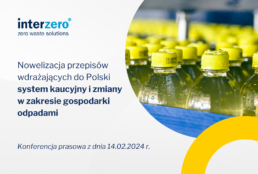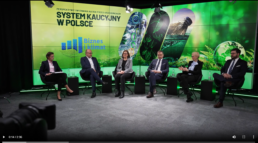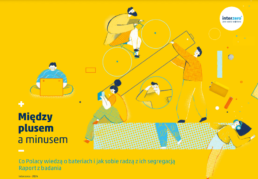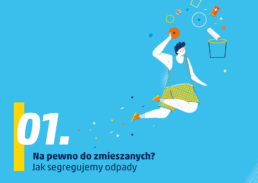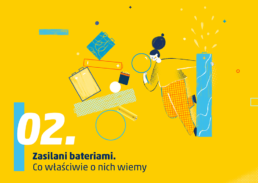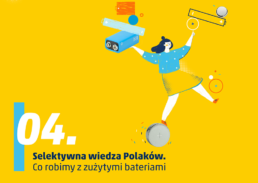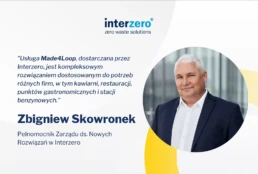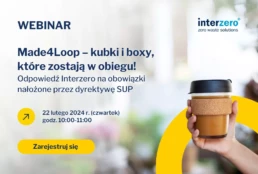Amendment to the regulations implementing the deposit system in Poland and changes in waste management
Amendment to the regulations implementing the deposit system in Poland and changes in waste management
On February 14, a press conference was held during which the Deputy Minister of Climate and Environment, Anita Sowińska, talked more about waste management solutions, changes in the BDO system, as well as about the planned implementation from 2025. deposit system.
During the event, the Deputy Minister emphasized that the deposit system, as assumed, would be launched at the beginning of 2025, but we can expect amendments regarding the system operators. The representative of the ministry emphasized that these changes would only be “technical”. This will concern obligations and documents submitted to control the system.
On March 5, there will be a consultation meeting with the industry, local government officials and trade representatives regarding changes to the Deposit Act. The deputy minister added that the deposit system, although it will start on January 1, 2025, “may happen that it will not be perfect from the very beginning, because the act requires some adjustments.”
The deputy minister also informed about planned changes in the BDO system . The modernization will respond to the main needs of users of this system. The changes will include, among others: development of the Report Module and introduction of new functionalities in the Account Management Module.
The expanded composition of the Advisory Team was also presented to the participants of the press conference in the field of waste management solutions. The advisory staff will include: Konfederacja Lewiatan, UNEP/GRID-Warsaw, Institute of Innovation and Responsible Development INNOWO, Polish Chamber of Waste Management, Polish Recycling Association and the National Fund for Environmental Protection and Water Management and more representatives of entrepreneurs, mainly from recycling industry, as well as non-governmental organizations and institutes.
Source:
https://zielona.interia.pl/smieci-plastik/news-system-kaucyjny-nie-ruszyl-a-juz-ma-byc-poprawka-wiceministr,nId,7335652#google_vignette
https://www.gov.pl/web/klimat/wiceministra-anita-sowinska-o-rozwiazaniach-w-zakresie-gospodarki-odpadami
Video: Dziennik Gazeta Prawna
As Interzero, we are happy to take part in debates and meetings with the ministry and industry representatives in order to better clarify our mutual needs and discuss current legal changes. We encourage you to read the summary of the debate “The deposit is already a year away and the system is in its infancy” on Dziennik Gazeta Prawna HERE , Where Paweł Sosnowski, Management Board Representative for Environmental Regulations with Interzero had the opportunity to discuss issues related to the deposit system together with: Andrzej Gantner, Vice-President and General Director at the Polish Federation of Food Producers Association of Employers, Anita Sowińska, Undersecretary of State at the Ministry of Climate and Environment, Joanna Kasowska, Director of Quality and Food Management Standards , Żabka Group; Filip Piotrowski, Climate Leadership, UNEP/GRID-Warszawa; Anna Larsson, Director of Implementation of circular economy models, Reloop Platform.
New report "Between plus and minus"
New Interzero report “Between plus and minus”
On the occasion of Battery Day, as part of the Eco no edges campaign, we are publishing a research report “Between plus and minus – what do Poles know about batteries and how do they deal with their segregation?” . The results are surprising. Despite being aware of the obligation to selectively collect waste, many of us still do not fulfill it. Poles perceive batteries as harmful both during production and storage. They also considered recycling dangerous for the environment. Despite many fears about batteries, we do not think about the power source in our devices.
Never before in history have we produced and consumed so many batteries. According to McKinsey & Company forecasts, their market will grow at a rate of 25% annually, and in the case of lithium-ion cells it may reach 30% annual growth by 2030. This demand is fueled, among others, by: through the development of portable digital technologies, energy banks and electromobility. With this dynamic progress in the battery industry, the question arises about the future of the management of this new waste.
In our latest study entitled ” Between plus and minus” we asked about Poles’ habits regarding selective waste collection, including hazardous waste. We also wanted to know their motivations and beliefs regarding battery recycling. What is positive is the fact that in the declarations a significant part of the respondents know how to properly deal with used batteries. However, serious doubts arise when it comes to more specific questions. What draws attention is the lack of knowledge about the benefits of recycling batteries and concerns about the harmfulness of this process. The fragility of supply chains and limited resources of raw materials in the European Union mean that we should treat used batteries and accumulators as strategic resources. The lithium, nickel, manganese and graphite present in the cells are of critical importance. Obtaining these elements, regardless of the sources, is expensive and risky, and replacing them in technologies at this stage of development seems simply impossible. The importance of recycling in this context is therefore both an action to protect the environment and ensure Europe’s raw material security.
The report “Between plus and minus” also surprises the group of young adults who turned out to be less prone to ecological behavior than older ones. Respondents under 35 years of age not only segregate waste less often, but also more often doubt the sense of processing secondary raw materials. The answers of this group should particularly stimulate reflection on the effectiveness of current educational and legislative activities.
You can find out more in the press release HERE.
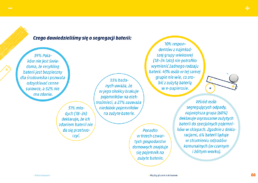
Entrepreneur! Remember about the annual BDO fee!
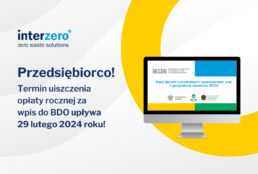
Entrepreneur! Remember about the annual BDO fee!
February 29 is the deadline for paying the annual fee for entry into the BDO in the amount of PLN 100 (micro-entrepreneurs) or PLN 300 (entrepreneurs other than micro-entrepreneurs). The fee should be paid to the account of the marshal’s office competent for the company’s registered office or place of residence.
Failure to pay the fee will result in removal from the Database on Products, Packaging and Waste Management (BDO) , and the business activity will be subject to a high financial penalty!
Entrepreneurs are subject to registration and annual fees:
- introducing electrical and electronic equipment and authorized representatives,
- introducing batteries or accumulators,
- introducing vehicles,
- producer, importer and intra-Community buyer of packaging,
- introducing products in packaging into the territory of the country,
- introducing tires into the territory of the country,
- introducing lubricating oils into the territory of the country.
Are you looking for support during the reporting period ?
Watch the free Interzero webinar “Everything you need to know about BDO”
More training at a favorable price can be found HERE
How do we perceive...waste? Słów kilka o projekcie „Obieg zamknięty. Odpady w fotografii”
How do we perceive… waste? A few words about the “Closed circuit. “Waste in photography”
Waste is substances or objects that people dispose of because they consider them unnecessary, used or dangerous. These may include, for example, food leftovers, packaging, used batteries, chemicals or used electronic equipment. The emotions they arouse in people can be diverse and depend on many factors, such as ecological awareness, level of education or culture.
Today we are talking about the inevitable need for change and the effects of human activity in the areas of energy, agriculture, production, consumption and waste management. Each of these topics is urgent, and our time is becoming increasingly limited.
As environmental educators , we face serious challenges. We must not only convey knowledge, but also influence the emotions of our recipients. This requires reflection, understanding and care for the participants of the educational process. Our work must be effective. Building social awareness is a process in which it is worth experimenting and engaging various groups of people and various topics.
As Interzero, representing the business sector, we decided to implement a project with the Museum of Photography in Krakow “Closed circuit. “Waste in photography”. The project included a series of meetings that would result in the creation of photographs and texts freely referring to the topic of waste.
We would like to thank Maria Masternak and Anna Sidorska from the Museum of Photography in Krakow, the workshop leaders Rafał Siderski and Krzysztof Story, all participants and our Project Manager Monika Krysztofińska.
We are extremely impressed with the results of this project. We are glad that the issue of waste is important not only for us, but also for a wider group of communities who believe that by working together, we can achieve a lot of good.
More information about the project can be found in the publication on Eko Bez Kantów : HERE
Photo Mateusz Woźniak, Magdalena Niezabitowska Krogulec, Tomasz Orłowski, Marta Wróblewska
Did you know that one of the European countries can benefit 100 percent? from renewable energy by 2025?

Did you know that one of the European countries can benefit 100 percent? from renewable energy by 2025?
Since March 2016, no coal-fired power stations have been operating in Scotland. Then the Longannet power station, located north-west of Edinburgh, which had been operating since 1973, was closed. This means that after 115 years, Scotland has stopped generating electricity from burning coal.
Statistics show that the share of renewable energy in Scotland’s total electricity consumption was 97.4%. in 2022, while a year earlier it was 90.1%. Scotland owes this result primarily to the development of onshore wind farms, which provided approximately 70%. green energy in the country. The remaining 30 percent provided offshore wind farms and hydroelectric power plants.
Scottish Renewables, the renewable energy industry association in Scotland, highlights how much progress has been achieved over the last decade. In 2011, the share of energy from renewable sources in the overall energy balance was only 37%.
The latest data shows that Scotland can benefit from 100%. from renewable energy by 2025 and even start transporting the surplus to other countries.
Plans include the installation and commissioning of a new wind farm of 60 SG 14-222 DD turbines for Moray West, an offshore wind farm owned by Ocean Winds, located off the coast of north-east Scotland in 2024. Each turbine will have an individual power of 14.7 MW; At the moment, it is the most powerful wind turbine ever created. Currently, Scotland is close to achieving the goal of full use of energy from renewable sources in the national electricity sector, and by 2030 the Scottish authorities plan to achieve a 50% share of renewable energy in the total consumption of electricity, heat and transport. The long-term goal is to achieve almost complete decarbonization by 2050.
Made4Loop – the answer to the new SUP responsibilities
Made4Loop – the answer to the new SUP responsibilities
Although the era of free disposable cups is slowly coming to an end, the changes do not have to mean a chaotic revolution in the company.
From July 1, 2024, entrepreneurs selling drinks in disposable cups will have to provide their customers with alternative packaging that will be more environmentally friendly. This change aims to reduce the amount of plastic waste and is one of the most controversial legislative moves regarding environmental protection in recent years. Although for many it may seem like just another legal and office formality, business owners may lose sleep because it means the need to take decisive action and look for effective solutions.
Therefore, entrepreneurs may consider introducing reusable packaging or packaging made of other materials, including oxo-degradable plastics. Alternatively, they may decide to introduce a deposit system for reusable packaging, which would allow them to be returned and reused.
That is why the Interzero service was created, based on a deposit system for reusable packaging. The Made4Loop model involves the use of reusable cups and packaging, which customers rent for a deposit and then return via a deposit system. In this way, the packaging remains in a closed loop and is reused dozens, if not hundreds of times.
You can find out more in the press release HERE
We would like to remind you that on February 22 there will be a webinar during which Zbigniew Skowronek himself will talk more about the Made4Loop service from Interzero. Registration at the link HERE
Take part in the Made4Loop training - cups and boxes that stay in circulation! Interzero's response to the obligations imposed by the SUP Directive
Take part in the Made4Loop training – cups and boxes that stay in circulation! Interzero’s response to the obligations imposed by the SUP Directive
We cordially invite you to the webinar entitled: “Made4Loop – cups and boxes that stay in circulation! Interzero’s response to the obligations imposed by the SUP Directive, which will take place on February 22, 2024 (Thursday).
The online training will be conducted by: Zbigniew Skowronek , Management Board Representative for New Solutions at Interzero
The scope of the webinar:
- New obligations for entrepreneurs arising from the SUP Directive,
- Consumer fee for cups and boxes,
- Obligation to provide an alternative to disposable packaging from July 1, 2024,
- What is looping? Definition, target groups,
- Made4Loop
More details and the registration page can be found at the link HERE
Registration for the webinar lasts until February 22, 2024 at 8:00.
We invite you!
Interzero among the winners of Forbes Diamonds 2024!
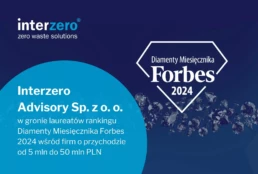
Interzero among the winners of Forbes Diamonds 2024!
We are pleased to announce that in the Forbes Diamonds 2024 ranking: revenues from PLN 5 to 50 million, the company of the Interzero group in Poland – Interzero Advisory sp. z o.o. about. – was ranked 77th in the Masovian Voivodeship and 311th on the nationwide list!
Forbes Monthly Diamonds is one of the leading rankings among private companies operating in Poland, the aim of which is to identify enterprises with the most dynamic growth in a given region and which have achieved the highest average annual increase in value. The list is based on the Swiss company valuation method, which takes into account, among others, financial results or asset values.
Thank you very much for this prestigious distinction; this is proof of continuous development and the result of the hard work of our employees, as well as an important indicator of our strengthening market position.
The full list is available on the official website of the project.
Could lack of waste become a problem? Statement by Anna Grom and Paweł Lesiak for Dziennik Gazeta Prawna
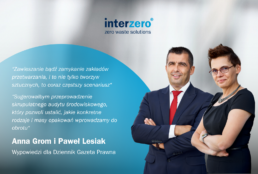
Could lack of waste become a problem? Statement by Anna Grom and Paweł Lesiak for Dziennik Gazeta Prawna
Without effective recycling, we will not meet our obligations related to closing the raw material cycle, which may result in high penalties. However, we can take appropriate action today, instead of idly waiting for changes.
Representatives of the Interzero Management Board: Anna Grom and Paweł Lesiak commented on this topic in Dziennik Gazeta Prawna .
“Suspending or closing processing plants is an increasingly common scenario also in Germany and Italy, i.e. in countries where financial outlays on the collection, sorting, transport and processing systems have been for years and still are much higher than in Poland,” he says. Anna Grom.
“The situation clearly got out of control, because no one probably expected that the EU would massively import recyclate from the other side of the world, the composition and quality of which we know nothing about. It’s high time to limit the import of untested and often falsely marked secondary raw materials. They displace better quality but more expensive raw materials processed on site from the market. Closing the borders like this can be good for everyone.” – says Paweł Lesiak.
“I would suggest conducting a current and thorough environmental audit , which will clearly determine what specific types and weights of packaging we introduce to the market. This year’s experience has shown that even large entities, due to the lack of reliable verification, can overestimate the weight of packaging by up to 40%. – adds Paweł Lesiak.
We encourage you to read the entire material “When lack of waste becomes a problem – will we face millions of fines?” at the link: HERE
On January 26, Interzero offices CLOSED
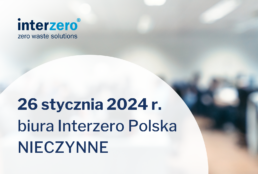
On January 26, 2024, Interzero offices are closed.
In connection with the resolution of the Management Boards of the Interzero group companies in Poland, on January 26 this year. all Interzero offices are closed.
We will respond to all messages upon our return.
We apologize for any inconvenience.
